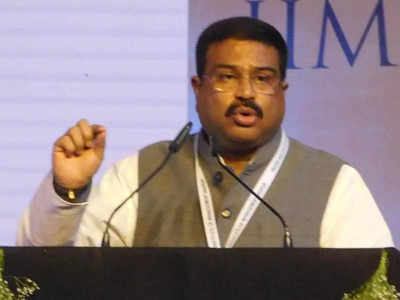- News
- Education News
- News
- Dharmendra Pradhan: Indian Knowledge System holds solutions to many of the world’s challenges
Trending
This story is from May 16, 2022
Dharmendra Pradhan: Indian Knowledge System holds solutions to many of the world’s challenges

Dharmendra Pradhan
NEW DELHI: A book on Indian Knowledge Systems for higher education students was released by union education minister Dharmendra Pradhan on the occasion of Buddha Purnima on Monday.
The book, titled “Introduction to Indian Knowledge Systems: Concepts and Applications”, authored by professor B Mahadevan of IIM, Bangalore, has been released this week. Described as “an idea whose time has come”, the book introduces concepts and applications of Indian Knowledge Systems to students of science and engineering in a way they can relate, appreciate and explore further.
Pradhan, in the presence of Subhas Sarkar, MoS for education along with K Sanjay Murthy, secretary higher education and Anil Sahasrabudhe, chairperson, AICTE, released the book and spoke about the global footprint of Indian knowledge, culture, philosophy and spirituality.He spoke about the ancient Indian civilisation and how it has positively impacted the world. Speaking about Vedas, Upanishads and other Indian texts, he said that our ancient heritage is full of treasures which need to be preserved, documented and propagated. He also spoke about various examples of science-based practices and knowledge from ancient India which we can find relevant still in the modern world.
Pradhan said that Indian education system is being decolonised under the leadership of Prime Minister Shri Narendra Modi. “While we adopt the good things from our ancient past, we must also be mindful of the problems in our society and build a future which creates synergy between knowledge from the past and contemporary issues. Solutions to many of the world's problems lie in the Indian Knowledge System,” he added.
The textbook is developed by IIM, Bangalore in association with VYASA Yoga Institute, Bengaluru, and Chinmaya Vishwa Vidyapeeth, Ernakulam. It is co-authored by aoosciate professor Vinayak Rajat Bhat, Chanakya University, Bengaluru and Nagendra Pavana R N, with the school of Vedic Knowledge Systems at Chinmaya Vishwa Vidyapeeth, Ernakulam.
The book is divided into four parts: Part 1 has a formal and concise introduction to IKS. Part 2 provides certain foundational concepts applicable across all domains of science and engineering. Part 3 is on science, engineering and Technology in IKS and Part 4 is about humanities and social sciences in IKS.
The book, titled “Introduction to Indian Knowledge Systems: Concepts and Applications”, authored by professor B Mahadevan of IIM, Bangalore, has been released this week. Described as “an idea whose time has come”, the book introduces concepts and applications of Indian Knowledge Systems to students of science and engineering in a way they can relate, appreciate and explore further.
Pradhan, in the presence of Subhas Sarkar, MoS for education along with K Sanjay Murthy, secretary higher education and Anil Sahasrabudhe, chairperson, AICTE, released the book and spoke about the global footprint of Indian knowledge, culture, philosophy and spirituality.He spoke about the ancient Indian civilisation and how it has positively impacted the world. Speaking about Vedas, Upanishads and other Indian texts, he said that our ancient heritage is full of treasures which need to be preserved, documented and propagated. He also spoke about various examples of science-based practices and knowledge from ancient India which we can find relevant still in the modern world.
Pradhan said that Indian education system is being decolonised under the leadership of Prime Minister Shri Narendra Modi. “While we adopt the good things from our ancient past, we must also be mindful of the problems in our society and build a future which creates synergy between knowledge from the past and contemporary issues. Solutions to many of the world's problems lie in the Indian Knowledge System,” he added.
The book, though targeted at students of engineering, its structure and the contents also address the requirement in other university systems (liberal arts, medicine, science and management). It aims to fill the gap for offering a required course on Indian Knowledge Systems (IKS), recently mandated by AICTE. Moreover, the New Education Policy (NEP) has also provided a clear trajectory for imparting IKS in the higher education curriculum.
The textbook is developed by IIM, Bangalore in association with VYASA Yoga Institute, Bengaluru, and Chinmaya Vishwa Vidyapeeth, Ernakulam. It is co-authored by aoosciate professor Vinayak Rajat Bhat, Chanakya University, Bengaluru and Nagendra Pavana R N, with the school of Vedic Knowledge Systems at Chinmaya Vishwa Vidyapeeth, Ernakulam.
The book is divided into four parts: Part 1 has a formal and concise introduction to IKS. Part 2 provides certain foundational concepts applicable across all domains of science and engineering. Part 3 is on science, engineering and Technology in IKS and Part 4 is about humanities and social sciences in IKS.
End of Article
FOLLOW US ON SOCIAL MEDIA










